Featured Publication
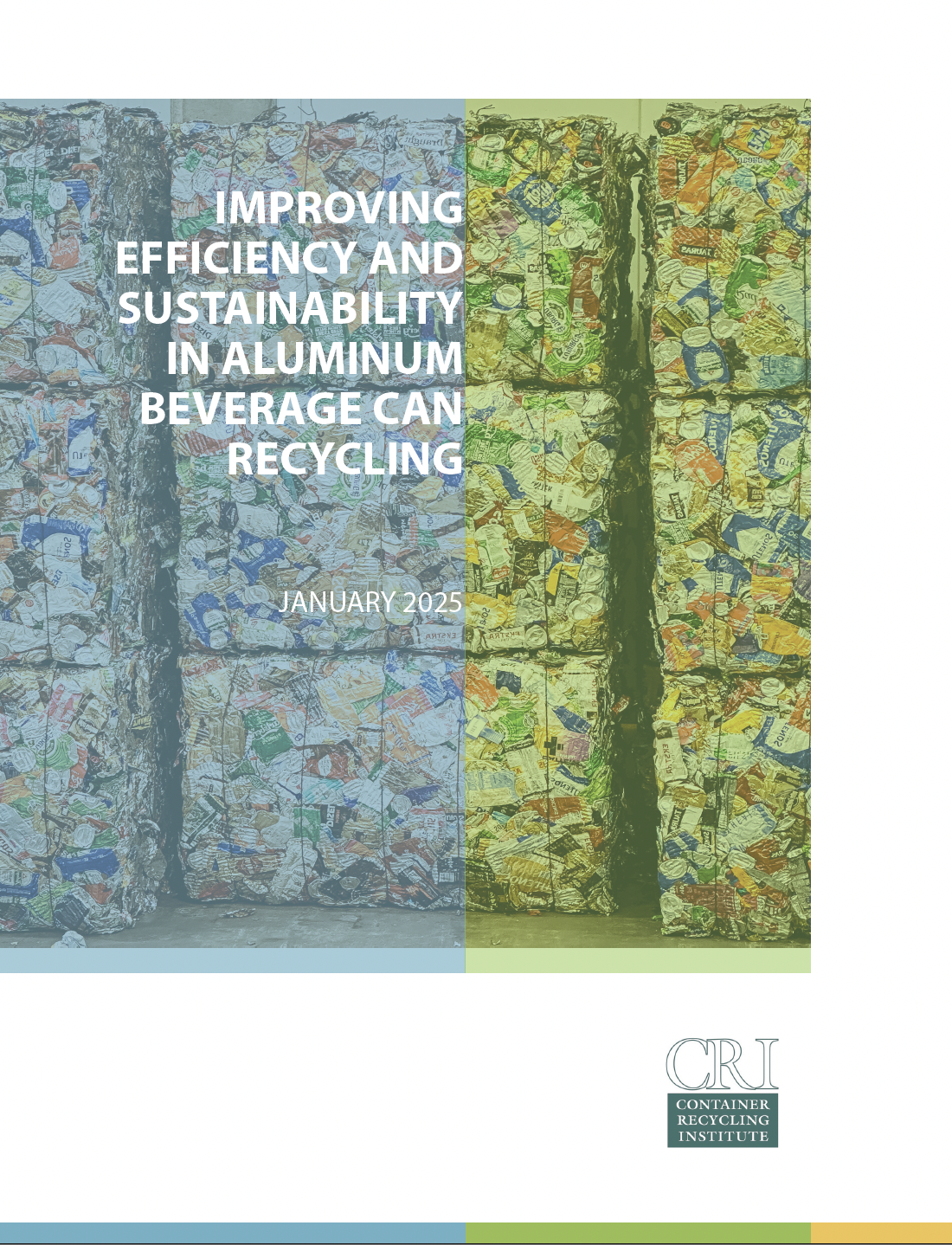
CRI 2025
Improving Efficiency and Sustainability in Aluminum Beverage Can Recycling
This report finds that "aluminum material losses at curbside recycling, materials recovery facilities (MRFs) and secondary melters are financially and environmentally significant enough to warrant discussion on new and expanded methods of aluminum beverage can recycling, sorting, processing and even design." Based on the data, it concludes that beverage container deposit return systems (DRS) are the most impactful strategy to achieve higher recycling rates. CRI is grateful for the Arconic Foundation's generous support, without which this report would not have been possible.
 CRI
CRI2023
CRI's 2023 Impact Report
This report provides insights into how CRI made a difference in 2023 through high-profile initiatives, legislative analysis and advocacy, and education and collaboration.
 CRI
CRI2023
The Impact of Deposit Return Systems on Beverage Sales
Released in July 2023, this study by CRI and Reloop finds no definitive evidence that new or expanded beverage container deposit return systems (DRS, aka bottle bills) alone impact beverage sales - suggesting beverage industry concerns that deposit systems lead to sales declines are unfounded.
 CRI
CRI2013
Bottled Up (2000-2010) - Beverage Container Recycling Stagnates
Three pronounced trends in American beverage consumption and recycling patterns have emerged since CRI’s first BMDA looked at year 2000 data: overall sales growth, non-carbonated sales growth, and stagnating recycling rates—all of which are resulting in higher rates of landfilling, incineration and littering, and other negative environmental impacts.
 VPIRG/ CRI
VPIRG/ CRI2013
A Clean and Green Vermont
As Vermont strives for a zero waste future, expanding Vermont’s Bottle Bill is the next logical step to increase recycling, prevent litter, enhance local economic activity, and cut costs for government and citizens.
General Interest
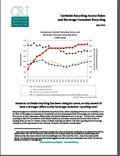
Curbside vs Beverage Fact Sheet 2012
July 2012 | Curbside Recycling Access Rates and Beverage Container Recycling
Download pdf[PDF, 246 KB]

by Container Recycling Institute
December 2011
Returning to Work: Understanding the Domestic Jobs Impacts from Different Methods of Recycling Beverage Containers
December 2011 | While the recycling's impact on jobs has been the subject of several studies in recent years, Returning to Work is the first report to take into account the vital importance of material quality, throughput quantities, processing dynamics and end-user needs to analyze the net gains in domestic jobs when beverage containers are recovered through recycling.By Clarissa Morawski and Jeffrey Morris for the Container Recycling Institute

by Container Recycling Institute
March 2011
CRI Comments on Natural Logic’s White Paper on EPR for Packaging
Natural Logic recently produced a white paper for the Coca Cola Company that summarizes an industry policy agenda for the next generation of packaging waste management stressing the principle of extended producer responsibility or “EPR.” CRI examines the paper and analyzes some flaws in its approach.

By Clarissa Morawski for the Container Recycling Institute
December 2009
Understanding Economic and Environmental Impacts of Single Stream Collection Systems
Using data from industry reports and interviews with recyclers, this report that highlights the economic and environmental impacts of switching to a single-stream system. It also includes ample data showing deposit-return to be one of the most effective collection systems for returning high-quality recycled material.
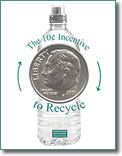 by the Container Recycling Institute
by the Container Recycling Institute4th edition, updated August 2006
The 10¢ Incentive to Recycle
The 10¢ Incentive to Recycle is intended to set the record straight on bottle bills and waste management by rebutting many of the arguments made by the anti-bottle bill beverage industry lobby. This nineteen page document will educate grassroots activists, policymakers and legislators regarding environmental and economic impacts of incentive-based recycling.
 by Jennifer Gitlitz of the Container Recycling Institute
by Jennifer Gitlitz of the Container Recycling InstituteJune 2002
Trashed Cans:The Global Environmental Impacts of Aluminum Can Wasting in America
This report from CRI documents the sharp rise in aluminum can wasting over the last thirty years and draws a detailed picture of the environmental impacts of extracting energy and resources to replace wasted cans. The report presents reasons for the recent decline in aluminum can recycling rates, and suggests bottle bills as one solution to reverse the wasting trend.
 by The Container Recycling Institute
by The Container Recycling InstituteUsing most current data available
Beverage Market Data Analysis
The Beverage Market Data Analysis is a comprehensive analysis on the beverage market, beverage container recycling trends, environmental information, and the effects of hypothetical deposit laws. In the form of several Excel spreadsheets, the BMDA places valuable beverage-related data at your fingertips, and it is the only publication that's fully customizable for you. BMDA's can be specially ordered for each of the 50 United States or the entire country, and seven regions.
 by the Container Recycling Institute
by the Container Recycling InstituteSummer 2008
Container and Packaging Recycling Update
CRI's newsletter contains current information on states, provinces and countries considering new or expanded bottle bills, as well as other current information on container and package recycling. The most recent issue from Summer 2008 contains the following:
Congressman Markey's bottle bill and climate protection legislation...
The results of a global summit on bottle bills...
Updates on a whopping 18 bottle bill campaigns...
CRI's beverage market research...
...and more!
Download PDF[654kb]![]()
 by PwC for DUH
by PwC for DUH2011
Reuse and Recycling Systems for Selected Beverage Packaging from a Sustainability Perspective
This PwC study compares the relative merits of refillable, container deposit, and "green dot" curbside collection systems. Deposit systems were found to be effective for attaining high recycling rates and high quality materials.
Download Aggregation of Selected, Significant Findings [PDF,74kb]![]()
Download full study (German) [PDF, 9.8MB]![]()
Location-specific
 VPIRG/ CRI
VPIRG/ CRI2013
A Clean and Green Vermont
As Vermont strives for a zero waste future, expanding Vermont’s Bottle Bill is the next logical step to increase recycling, prevent litter, enhance local economic activity, and cut costs for government and citizens.
 TLCV
TLCV2013
The Potential Economic Impact of a Texas Beverage Container Deposit Refund System
The popularity of and need for recycling has increased significantly in recent years. Numerous organizations and municipalities across the country have spent thousands of hours and millions of dollars on efforts to increase recycling rates, and, in fact, rates have steadily risen since 1960.
 Bommerang Alliance
Bommerang Alliance2013
9 Reasons Why the Next WA Government
Should Adopt a Container Deposit Scheme
This short paper provides a concise explanation of why the next Western Australian Government should adopt a state based container deposit/refund scheme (CDS) – regardless of any deliberations about the merit of a national scheme.
 Alberta Beverage Container Management Board
Alberta Beverage Container Management Board2010
Benchmarking Evaluation of Alberta’s Stewardship
Program for Recycling Empty Beverage Containers
A thorough look at Alberta's beverage container deposit system, its successes, and areas for potential improvement. Also includes summaries of deposit programs throughout Canada, the US, and Europe. Produced by Meyers Norris Penny.
 Campaign to Protect Rural England
Campaign to Protect Rural England2010
Have we got the bottle?
Implementing a deposit refund scheme in the UK
The Campaign to Protect Rural England's research for a drinks container deposit scheme covering glass bottles, plastic bottles and cans shows it would cost little to set up, and would generate revenue to support most of its own running costs. The research demonstrates how a scheme would help the Government achieve a ‘Zero Waste’ economy by increasing recycling rates, and reducing litter.
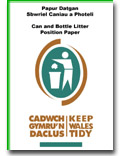 by Gareth Clubb of Keep Wales Tidy
by Gareth Clubb of Keep Wales Tidy2006
Can and Bottle Litter position paper
This comprehensive document makes a detailed case for bottle bills as the most effective and economical solution for the problem of beverage container litter. While written to address litter in Wales, the document uses examples from different locales to address numerous issues: The proportion of litter comprised of beverage containers, the environmental and social benefits of a deposit law, the effectiveness of a financial incentive, and the overall economic logic of a deposit-based recycling system. This paper is a must-read for anyone looking for a cohesive argument on the benefits of bottle bills.
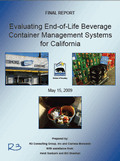 by R3 Consulting and Clarissa Morawski
by R3 Consulting and Clarissa Morawski2009
Evaluating End-of-Life Beverage Container Management Systems for California
This study, which was undertaken to help the government of California improve its beverage container deposit program, compares several recycling systems within California and around the world, including selected deposit-refund programs. Recommendations to improve California's recycling system indicate best practices that can be applied to many recycling systems.